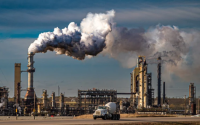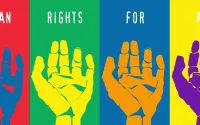23June 2004
Hilary AnderssonBBC Africa correspondent
A pro-government Arab militia, known as the Janjaweed, is accused of carrying out a campaign of ethnic cleansing against the black African population there. Hilary Andersson has been to one of the Darfur refugee camps
It is very disturbing to be a me or a you and to see what is happening in Darfur.
To see humanity stripped to its barest bones. To see people so traumatised that they stutter from their memories, or wail at night, and now so destitute that they simply have nothing.
Not a blanket, not shelter, not water, not food, not basic health. Nothing. And the prospect of things getting worse.
I spoke to so many displaced Darfurians that my notebook is jammed with endless identifying scribbles like woman in red headdress; starving child with crinkled face like old man; pathetic-looking child leaning against mother - and next to them name after name.
Stories that relay horror piled on horror. And stories that are all very similar.
Out of all of them, the first displaced woman I spoke to in Darfur sticks in my mind, though her name is lost to me.
She sat on a small mat with her nine-month-old boy who was gaunt and famished. His name was Abdul Rahim.
One morning, before dawn at 0400, Abdul's mother was sleeping in her village - Shattay - when they came. The Janjaweed. A word that carries tremendous fear.
It is a play on the local, roughly spoken Arabic and translates as "evil men on horseback with guns".
This was the dawn when the so-called evil ones set fire to her village.
She heard chaos breaking out and ran with her children. The Janjaweed were firing, killing men and, so she and others said, shooting and hurting children too.
Her husband fled also. She does not know if he was killed.
The next day, children in tow, she began her three-day journey to Kalma, in searing Saharan heat.
On her way to the camp her seven-year-old child could not cope - and he died.
She told this part of the story in a matter-of-fact sort of way.
I suppose she knows that Abdul, her youngest, might die of hunger - and she has no house now, no shelter, no blanket.
"How do you find it here?" someone asked her.
She answered without hesitation and quietly. "It is better than dying," she said. Perhaps you have to have seen the horror of death in Darfur to make a statement like that.
For outsiders it is hard to see anything redeeming about life for the displaced people.
In the past two weeks I have met families with no food at all in their shacks.
I have seen a family's one bowl of rotting food crawling with insects. Seen a starving child being washed in water dirtied with his own blood. Seen stick-thin infants covered in excrement and throwing up their food because they are too weak to eat it.
Starvation is a horror. It is a slow and painful way of dying.
Mothers have to watch their children suffering terribly in the process.
It makes you want to scream to see it.
Except you cannot because it is not your trauma, it is someone else's and they do the screaming.
It happens at night.
I say that because we kept hearing it. We stayed in a camp called Mornei for three nights, right next to a small tent.
The tent served as a clinic for the worst cases of children with severe malnutrition.
Some of the children who came into that tent daily looked barely alive.
Strangely, if you looked at any one of them for long enough they would look back with large, penetrating, angry eyes. It was haunting.
The tent stank. The temperature was over 40C (104F).
When the sun went down there came a slight relief.
But it was the minute drop of heat in the evenings that was killing the weakened children - their bodies too traumatised to cope with any change at all.
And so, after going to bed, at two or three in morning the darkness and silence would be abruptly cut through with the sound of an awful scream of anguish as a mother mourned her child's passing away.
That, at this awfully lonely hour, would start it all off. The donkeys would let rip tortured moans, the famished dogs would begin to howl.
And if ever there was a reason or place for the imagination to start working, it was this.
One night when the wailing began, the stories from the day began circling in my head and I realised that these must be the same screams heard in the villages at the moment of attack by the Janjaweed - these were after all the same noises of catastrophe from the same people.
I began to imagine the gut-wrenching fear that the mothers must have felt when - having heard for months of villages nearby being burned - their turn came.
All the houses on fire, their neighbours screaming and running, their children scattering in the chaos, running past dead bodies on their way out of the village, not knowing if their husbands were alive or dead.
Sleeping perhaps under a tree. Walking the next morning with no shelter, no family in the middle of a desert.
Then ending up in the nearest town, only to find everyone else there half-starved.
It is a terrifying thought process - made all the more real because, not a few hundred metres from where we slept, where the refugees sleep nightly, are the Janjaweed.
The very men who are tormenting the civilians by driving them from their villages are right in the middle of the camps, patrolling them by day, terrorising the women by night.
If the women try to go out of the camps to get food they face the real prospect of being killed, beaten or raped.
No-one has documented it precisely but probably thousands of women have been raped so far.
Can you imagine how frightened these people are? They are refugees, but they have found no safe refuge.
There is a lot more to said about Darfur. But one of the most galling thoughts is this.
These people do not have to be starving. There is not a major drought, there is a war.
This situation has been brought about by men.
The men involved are the Janjaweed militia and the Sudanese government which has admitted to backing the militia in parts of this war - though the government also says it cannot control them.
Either way, the destruction of Darfur is a massive reprisal against a black Darfur rebel group - the Sudanese Liberation Movement (SLM) - which is fighting for greater representation for the region.
Fair enough, fight the rebel group - you might say. Governments cannot just ignore rebellions on their territory, and militias will be militias.
For the sake of argument, let us be generous to the armies here - that is war.
But why take it out on the mothers, the children, the old men, the civilians?
That is the evil of what is happening in Darfur.
These are the facts: children are starving to death because of a fight between a group of powerful, well-armed, dirty fighting men - who are grown-ups.
And many more will die before this is over.
http://news.bbc.co.uk/1/hi/programmes/from_our_own_correspondent/3840427.stm






